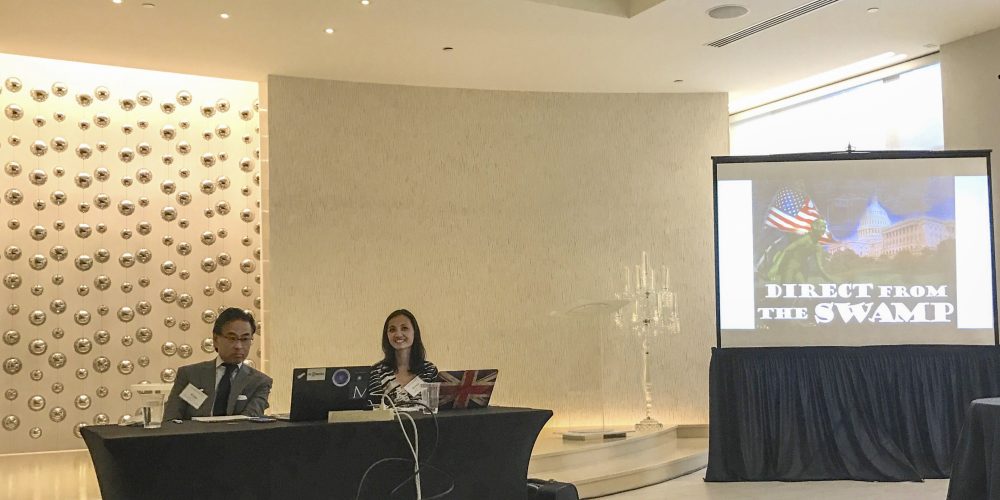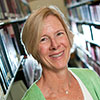This article is more than 5 years old.

Direct from the Swamp: Alan Inouye, Director of Public Policy, ALA and Krista Cox, Directory of Public Policy Initiatives, ARL gave an overview of policy and organizational developments in the Trump Administration and 115th Congress in a Trumpesque session room
The CNI (Coalition for Networked Information) Spring 2017 membership meeting was held in Albuquerque, NM in early April. As is typical with CNI meetings, there was enough content for a three-day meeting, but it is all stuffed into a 24 hour period! The structure is 7 groups of 6-8 project briefs bookended by an opening and a closing plenary session. So, I did the best I could to attend something in each slot, meaning I could attend both plenaries and 7 sessions (out of 53 possible). That’s why it’s helpful to have post-meeting access to session presentations via Project Briefing Pages.
So, few highlights from the sessions I attended:
The opening plenary speaker was Alison Head, from Project Information Literacy. Her topic was “What Today’s Students Have Taught Us.” A video of her entire talk is available for those of you who would like to dig deeper than the selected highlights I’m able to provide here. Project Information Literacy is a national and ongoing (since 2008) study involving 60 colleges and universities. They use social science methods – qualitative and mixed methods. They are interested in the stories. She presented PIL’s information-seeking model and key research takeaways:
- Students say research is more difficult than ever before. Gauging process is particularly hard
- Student have the most difficulty with getting started on assignments (have trouble defining, narrowing, and settling on a topic)
- Frustrations begin with finding context and research processes vary for every student, each time
- Student us a strategy driven by familiarity and efficiency
- Most information skills evolved over time
For those of you teaching information literacy, there is a lot of good content in this talk!
I couldn’t resist a presentation that promised to talk direct from the swamp (see image above). They were reassuring that we still live in a system of checks and balances and that Congress hasn’t really changed since the election (I’m not sure how reassuring this really is). In their work, Inouye and Cox are working to align with coalitions broader than higher ed and libraries, for instance surveillance and copyright. They discussed the skinny budget that excludes NSF, IMLS and NEH and the federal hiring freeze. Public support is imperative to explain why the cuts matter.
The rest of the afternoon – Jenn Stringer from Berkeley gave a presentation on the work to develop guiding principles for the collection and use of learning data. In “But We Don’t Do Research Like That Anymore“,University of Calgary Vice Provost and University Librarian Thomas Hickerson reported on a series of workshops supported by the Mellon Foundation. The purpose was to identify the new forms of support for multidisciplinary research needs by scholars. From this they have developed next steps to transform their research support environment based on new library roles and relationships.
Tuesday began with two case studies that looked at capacity building in digital scholarship services, one at the Chinese University of Hong Kong Library and the other at Claremont, who has taken a “learn by doing.” approach. Joe Williams from UNC presented on their program to train students to provide digital scholarship support. They depend on students in three different locations and approach each one a bit differently. Roger Schonfeld and Danielle Cooper from Ithaka S+R talked about changing research practices among humanities faculty and how their needs relate to the needs of the faculty-at-large. The final project briefing session featured CNI Associate Executive Director Joan Lippincott on a panel that presented observations about the evolution of library high technology collaborative spaces, a subject that is near and dear to ZSR these days.
The meeting concluded with a closing plenary with AMy Brand from MIT Press as the speaker. She talked about the functions and challenges for today’s university presses. Her talk was captured in this video.
If only this ended my CNI story, but it did not. After a VERY early 6 am flight that should have had me back to W-S by lunchtime. I arrived in Atlanta for my connecting flight. A storm stopped flights in and out and caused major problems for Delta for days! I wish I could report that my first overnight spent in an airport was adventurous, but it was really just awful. I managed to get a car rental the next morning and drove the 5 hour trip home with less than 1 hour of sleep in 32 hours. And I was one of the lucky ones in the whole massive mess. My luggage showed up 2 days later.
So it’s been useful to review my notes and remember the value of the actual conference, which was almost wiped out by the aggravation of trying to get home. On another positive note, I caught up with our old colleague Erik, so it was great to see him and get in a bit of sightseeing (he was always good for that!). Check out our visit to the Petroglyph National Monument!
As usual, signing off with a few pictures:
View of Downtown Albuquerque from the Conference hotel
What better place for a dinner out than The Library Bar & Grill?
It’s always good to catch up with our old colleague Erik Mitchell for travel adventures. Here we are at the Zimmerman Library, University of Mexico.




4 Comments on ‘Susan at CNI Albuquerque, Spring 2017’
Great report and photos, Susan! I’m marking my calendar to make time to watch Alison Head’s video! You handled your travel challenges with grace and aplomb!
Yes, great report, and I’m glad you’re not stuck in Atlanta eternally. Thank you for sharing!
Thank you for this report, Susan! I can’t wait to take a look at the digital scholarship presentations.
I tracked down one of those Ithaka S + R reports — thanks!